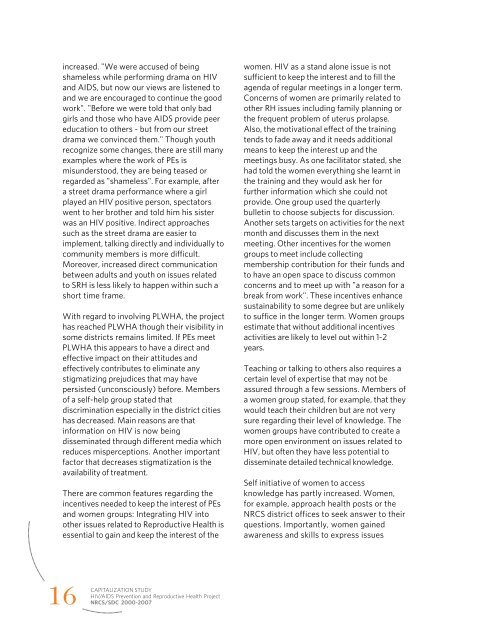HIV/AIDS Prevention & Reproductive Health Project
HIV/AIDS Prevention & Reproductive Health Project
HIV/AIDS Prevention & Reproductive Health Project
You also want an ePaper? Increase the reach of your titles
YUMPU automatically turns print PDFs into web optimized ePapers that Google loves.
increased. "We were accused of being<br />
shameless while performing drama on <strong>HIV</strong><br />
and <strong>AIDS</strong>, but now our views are listened to<br />
and we are encouraged to continue the good<br />
work". "Before we were told that only bad<br />
girls and those who have <strong>AIDS</strong> provide peer<br />
education to others - but from our street<br />
drama we convinced them." Though youth<br />
recognize some changes, there are still many<br />
examples where the work of PEs is<br />
misunderstood, they are being teased or<br />
regarded as "shameless". For example, after<br />
a street drama performance where a girl<br />
played an <strong>HIV</strong> positive person, spectators<br />
went to her brother and told him his sister<br />
was an <strong>HIV</strong> positive. Indirect approaches<br />
such as the street drama are easier to<br />
implement, talking directly and individually to<br />
community members is more difficult.<br />
Moreover, increased direct communication<br />
between adults and youth on issues related<br />
to SRH is less likely to happen within such a<br />
short time frame.<br />
With regard to involving PLWHA, the project<br />
has reached PLWHA though their visibility in<br />
some districts remains limited. If PEs meet<br />
PLWHA this appears to have a direct and<br />
effective impact on their attitudes and<br />
effectively contributes to eliminate any<br />
stigmatizing prejudices that may have<br />
persisted (unconsciously) before. Members<br />
of a self-help group stated that<br />
discrimination especially in the district cities<br />
has decreased. Main reasons are that<br />
information on <strong>HIV</strong> is now being<br />
disseminated through different media which<br />
reduces misperceptions. Another important<br />
factor that decreases stigmatization is the<br />
availability of treatment.<br />
There are common features regarding the<br />
incentives needed to keep the interest of PEs<br />
and women groups: Integrating <strong>HIV</strong> into<br />
other issues related to <strong>Reproductive</strong> <strong>Health</strong> is<br />
essential to gain and keep the interest of the<br />
women. <strong>HIV</strong> as a stand alone issue is not<br />
sufficient to keep the interest and to fill the<br />
agenda of regular meetings in a longer term.<br />
Concerns of women are primarily related to<br />
other RH issues including family planning or<br />
the frequent problem of uterus prolapse.<br />
Also, the motivational effect of the training<br />
tends to fade away and it needs additional<br />
means to keep the interest up and the<br />
meetings busy. As one facilitator stated, she<br />
had told the women everything she learnt in<br />
the training and they would ask her for<br />
further information which she could not<br />
provide. One group used the quarterly<br />
bulletin to choose subjects for discussion.<br />
Another sets targets on activities for the next<br />
month and discusses them in the next<br />
meeting. Other incentives for the women<br />
groups to meet include collecting<br />
membership contribution for their funds and<br />
to have an open space to discuss common<br />
concerns and to meet up with "a reason for a<br />
break from work". These incentives enhance<br />
sustainability to some degree but are unlikely<br />
to suffice in the longer term. Women groups<br />
estimate that without additional incentives<br />
activities are likely to level out within 1-2<br />
years.<br />
Teaching or talking to others also requires a<br />
certain level of expertise that may not be<br />
assured through a few sessions. Members of<br />
a women group stated, for example, that they<br />
would teach their children but are not very<br />
sure regarding their level of knowledge. The<br />
women groups have contributed to create a<br />
more open environment on issues related to<br />
<strong>HIV</strong>, but often they have less potential to<br />
disseminate detailed technical knowledge.<br />
Self initiative of women to access<br />
knowledge has partly increased. Women,<br />
for example, approach health posts or the<br />
NRCS district offices to seek answer to their<br />
questions. Importantly, women gained<br />
awareness and skills to express issues<br />
16<br />
CAPITALIZATION STUDY<br />
<strong>HIV</strong>/<strong>AIDS</strong> <strong>Prevention</strong> and <strong>Reproductive</strong> <strong>Health</strong> <strong>Project</strong><br />
NRCS/SDC 2000-2007

















